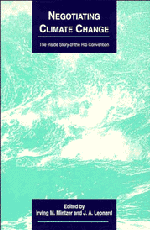Book contents
- Frontmatter
- Contents
- Acknowledgements
- Commonly Used Acronyms
- Foreword
- Part I Background
- 1 Visions of a Changing World
- 2 Prologue to the Climate Change Convention
- Part II Views from Within the Ring
- Part III The Outside Edges In
- Part IV Prospects for the Future
- Appendix: The Framework Convention on Climate Change
- Index
2 - Prologue to the Climate Change Convention
Published online by Cambridge University Press: 01 June 2011
- Frontmatter
- Contents
- Acknowledgements
- Commonly Used Acronyms
- Foreword
- Part I Background
- 1 Visions of a Changing World
- 2 Prologue to the Climate Change Convention
- Part II Views from Within the Ring
- Part III The Outside Edges In
- Part IV Prospects for the Future
- Appendix: The Framework Convention on Climate Change
- Index
Summary
The Climate Change Issue Comes of Age
Although some were disappointed with the admittedly modest achievements of the UN Framework Convention on Climate Change, what is striking about the climate change issue is not how slowly the issue has developed—but how quickly. As recently as 1985, when a major international scientific workshop was held in Villach, Austria, the US government participants went without instructions. Within three years, governments had decided to establish the Intergovernmental Panel on Climate Change (IPCC) to provide a scientific and policy assessment of the problem. And less than four years later, international negotiations on a climate change convention were completed and the UN Framework Convention on Climate Change (FCCC) was adopted and signed.
The evolution of awareness about climate change can be separated into three stages. The first stage, stretching from the mid-1950s to mid-1980s, witnessed the emergence of a broad scientific consensus. During the second stage, from about 1985 to 1988, public and political interest in the problem grew. And the final ongoing stage has involved the formulation of an international policy response.
The Development of Scientific Consensus
Although the general concept of the greenhouse effect has been understood since the 1820s, and the warming influence of increased atmospheric concentrations of carbon dioxide was predicted more than a century ago, widespread scientific concern about the problem emerged only in the last ten to twenty years. This resulted from several scientific developments.
- Type
- Chapter
- Information
- Negotiating Climate ChangeThe Inside Story of the Rio Convention, pp. 45 - 74Publisher: Cambridge University PressPrint publication year: 1994
- 14
- Cited by



